An Analysis of Jean-Paul Sartre's Existentialism and its Modern Impact
VerifiedAdded on 2020/03/02
|10
|2703
|66
Essay
AI Summary
This essay provides an in-depth analysis of Jean-Paul Sartre's Existentialism, highlighting its core tenets and its significant influence on modern concepts. It explores Sartre's perspective on authentic existence, the challenges of living in a modern world characterized by cultural relativism and the loss of traditional values. The essay examines the impact of globalization, scientific advancements, and the decline of traditional structures on the individual's search for meaning and identity. It also discusses the rise of individualism, the critique of traditionalism, and the importance of cultivating a common humanity in response to global challenges. By examining Sartre's ideas, the essay sheds light on the complexities of the human condition in the contemporary world and the ongoing quest for self-definition in the face of existential uncertainty. The essay draws on the works of other existentialist thinkers, such as Albert Camus and Simone de Beauvoir, and references to other writers such as T.S. Eliot and Robert Musil, to demonstrate how Sartre's ideas resonate across different cultural and intellectual contexts.
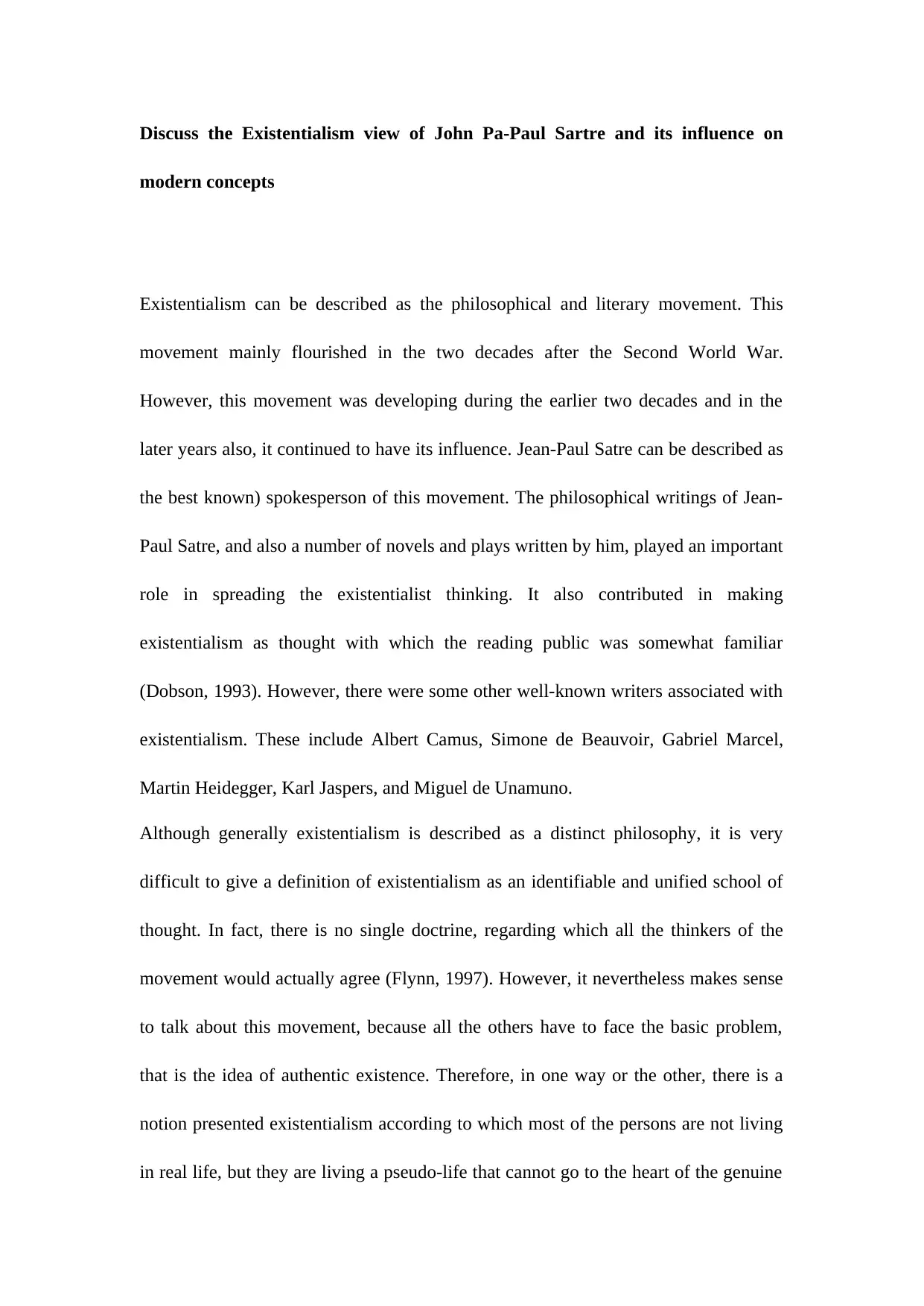
Discuss the Existentialism view of John Pa-Paul Sartre and its influence on
modern concepts
Existentialism can be described as the philosophical and literary movement. This
movement mainly flourished in the two decades after the Second World War.
However, this movement was developing during the earlier two decades and in the
later years also, it continued to have its influence. Jean-Paul Satre can be described as
the best known) spokesperson of this movement. The philosophical writings of Jean-
Paul Satre, and also a number of novels and plays written by him, played an important
role in spreading the existentialist thinking. It also contributed in making
existentialism as thought with which the reading public was somewhat familiar
(Dobson, 1993). However, there were some other well-known writers associated with
existentialism. These include Albert Camus, Simone de Beauvoir, Gabriel Marcel,
Martin Heidegger, Karl Jaspers, and Miguel de Unamuno.
Although generally existentialism is described as a distinct philosophy, it is very
difficult to give a definition of existentialism as an identifiable and unified school of
thought. In fact, there is no single doctrine, regarding which all the thinkers of the
movement would actually agree (Flynn, 1997). However, it nevertheless makes sense
to talk about this movement, because all the others have to face the basic problem,
that is the idea of authentic existence. Therefore, in one way or the other, there is a
notion presented existentialism according to which most of the persons are not living
in real life, but they are living a pseudo-life that cannot go to the heart of the genuine
modern concepts
Existentialism can be described as the philosophical and literary movement. This
movement mainly flourished in the two decades after the Second World War.
However, this movement was developing during the earlier two decades and in the
later years also, it continued to have its influence. Jean-Paul Satre can be described as
the best known) spokesperson of this movement. The philosophical writings of Jean-
Paul Satre, and also a number of novels and plays written by him, played an important
role in spreading the existentialist thinking. It also contributed in making
existentialism as thought with which the reading public was somewhat familiar
(Dobson, 1993). However, there were some other well-known writers associated with
existentialism. These include Albert Camus, Simone de Beauvoir, Gabriel Marcel,
Martin Heidegger, Karl Jaspers, and Miguel de Unamuno.
Although generally existentialism is described as a distinct philosophy, it is very
difficult to give a definition of existentialism as an identifiable and unified school of
thought. In fact, there is no single doctrine, regarding which all the thinkers of the
movement would actually agree (Flynn, 1997). However, it nevertheless makes sense
to talk about this movement, because all the others have to face the basic problem,
that is the idea of authentic existence. Therefore, in one way or the other, there is a
notion presented existentialism according to which most of the persons are not living
in real life, but they are living a pseudo-life that cannot go to the heart of the genuine
Paraphrase This Document
Need a fresh take? Get an instant paraphrase of this document with our AI Paraphraser
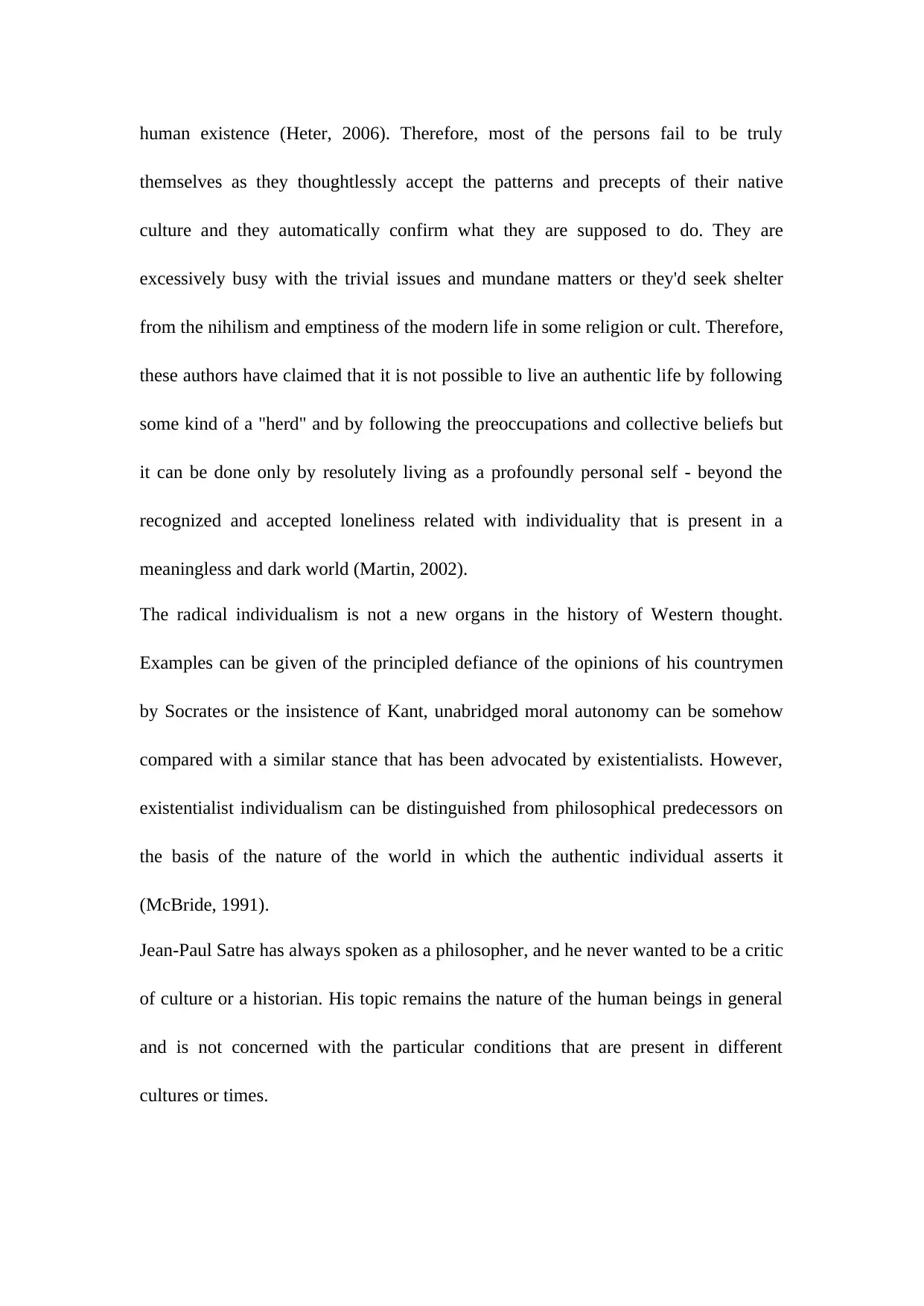
human existence (Heter, 2006). Therefore, most of the persons fail to be truly
themselves as they thoughtlessly accept the patterns and precepts of their native
culture and they automatically confirm what they are supposed to do. They are
excessively busy with the trivial issues and mundane matters or they'd seek shelter
from the nihilism and emptiness of the modern life in some religion or cult. Therefore,
these authors have claimed that it is not possible to live an authentic life by following
some kind of a "herd" and by following the preoccupations and collective beliefs but
it can be done only by resolutely living as a profoundly personal self - beyond the
recognized and accepted loneliness related with individuality that is present in a
meaningless and dark world (Martin, 2002).
The radical individualism is not a new organs in the history of Western thought.
Examples can be given of the principled defiance of the opinions of his countrymen
by Socrates or the insistence of Kant, unabridged moral autonomy can be somehow
compared with a similar stance that has been advocated by existentialists. However,
existentialist individualism can be distinguished from philosophical predecessors on
the basis of the nature of the world in which the authentic individual asserts it
(McBride, 1991).
Jean-Paul Satre has always spoken as a philosopher, and he never wanted to be a critic
of culture or a historian. His topic remains the nature of the human beings in general
and is not concerned with the particular conditions that are present in different
cultures or times.
themselves as they thoughtlessly accept the patterns and precepts of their native
culture and they automatically confirm what they are supposed to do. They are
excessively busy with the trivial issues and mundane matters or they'd seek shelter
from the nihilism and emptiness of the modern life in some religion or cult. Therefore,
these authors have claimed that it is not possible to live an authentic life by following
some kind of a "herd" and by following the preoccupations and collective beliefs but
it can be done only by resolutely living as a profoundly personal self - beyond the
recognized and accepted loneliness related with individuality that is present in a
meaningless and dark world (Martin, 2002).
The radical individualism is not a new organs in the history of Western thought.
Examples can be given of the principled defiance of the opinions of his countrymen
by Socrates or the insistence of Kant, unabridged moral autonomy can be somehow
compared with a similar stance that has been advocated by existentialists. However,
existentialist individualism can be distinguished from philosophical predecessors on
the basis of the nature of the world in which the authentic individual asserts it
(McBride, 1991).
Jean-Paul Satre has always spoken as a philosopher, and he never wanted to be a critic
of culture or a historian. His topic remains the nature of the human beings in general
and is not concerned with the particular conditions that are present in different
cultures or times.
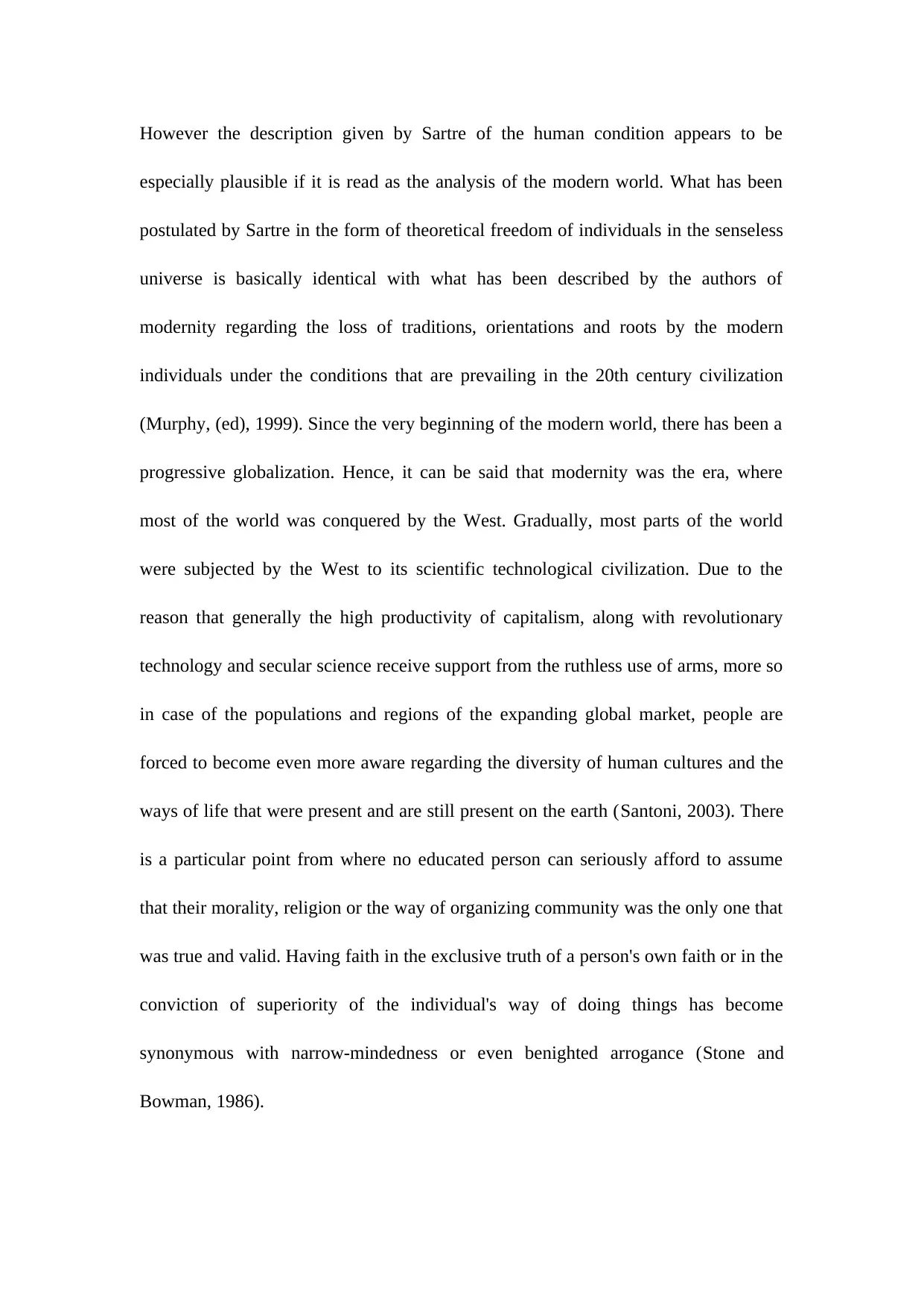
However the description given by Sartre of the human condition appears to be
especially plausible if it is read as the analysis of the modern world. What has been
postulated by Sartre in the form of theoretical freedom of individuals in the senseless
universe is basically identical with what has been described by the authors of
modernity regarding the loss of traditions, orientations and roots by the modern
individuals under the conditions that are prevailing in the 20th century civilization
(Murphy, (ed), 1999). Since the very beginning of the modern world, there has been a
progressive globalization. Hence, it can be said that modernity was the era, where
most of the world was conquered by the West. Gradually, most parts of the world
were subjected by the West to its scientific technological civilization. Due to the
reason that generally the high productivity of capitalism, along with revolutionary
technology and secular science receive support from the ruthless use of arms, more so
in case of the populations and regions of the expanding global market, people are
forced to become even more aware regarding the diversity of human cultures and the
ways of life that were present and are still present on the earth (Santoni, 2003). There
is a particular point from where no educated person can seriously afford to assume
that their morality, religion or the way of organizing community was the only one that
was true and valid. Having faith in the exclusive truth of a person's own faith or in the
conviction of superiority of the individual's way of doing things has become
synonymous with narrow-mindedness or even benighted arrogance (Stone and
Bowman, 1986).
especially plausible if it is read as the analysis of the modern world. What has been
postulated by Sartre in the form of theoretical freedom of individuals in the senseless
universe is basically identical with what has been described by the authors of
modernity regarding the loss of traditions, orientations and roots by the modern
individuals under the conditions that are prevailing in the 20th century civilization
(Murphy, (ed), 1999). Since the very beginning of the modern world, there has been a
progressive globalization. Hence, it can be said that modernity was the era, where
most of the world was conquered by the West. Gradually, most parts of the world
were subjected by the West to its scientific technological civilization. Due to the
reason that generally the high productivity of capitalism, along with revolutionary
technology and secular science receive support from the ruthless use of arms, more so
in case of the populations and regions of the expanding global market, people are
forced to become even more aware regarding the diversity of human cultures and the
ways of life that were present and are still present on the earth (Santoni, 2003). There
is a particular point from where no educated person can seriously afford to assume
that their morality, religion or the way of organizing community was the only one that
was true and valid. Having faith in the exclusive truth of a person's own faith or in the
conviction of superiority of the individual's way of doing things has become
synonymous with narrow-mindedness or even benighted arrogance (Stone and
Bowman, 1986).
⊘ This is a preview!⊘
Do you want full access?
Subscribe today to unlock all pages.

Trusted by 1+ million students worldwide
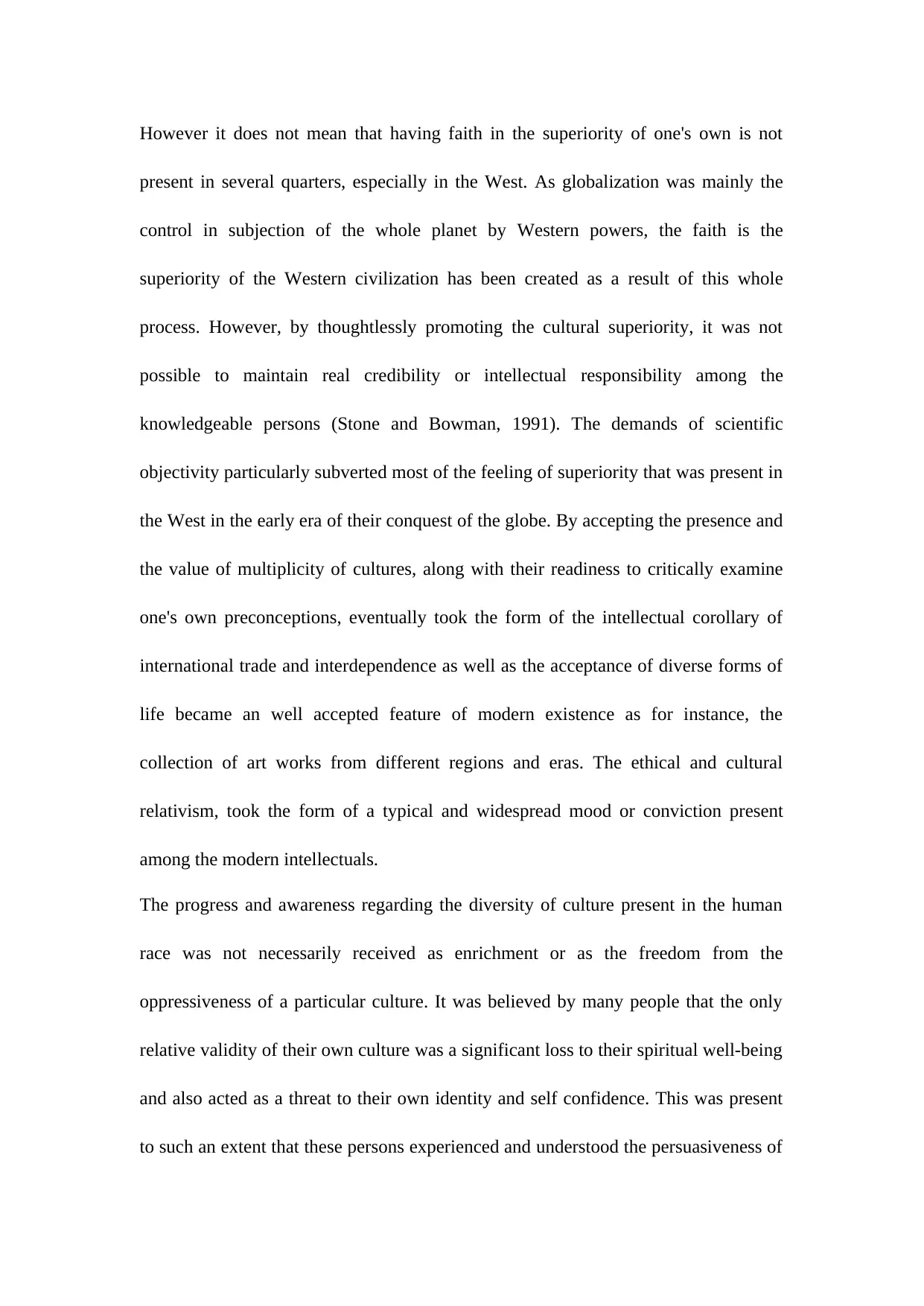
However it does not mean that having faith in the superiority of one's own is not
present in several quarters, especially in the West. As globalization was mainly the
control in subjection of the whole planet by Western powers, the faith is the
superiority of the Western civilization has been created as a result of this whole
process. However, by thoughtlessly promoting the cultural superiority, it was not
possible to maintain real credibility or intellectual responsibility among the
knowledgeable persons (Stone and Bowman, 1991). The demands of scientific
objectivity particularly subverted most of the feeling of superiority that was present in
the West in the early era of their conquest of the globe. By accepting the presence and
the value of multiplicity of cultures, along with their readiness to critically examine
one's own preconceptions, eventually took the form of the intellectual corollary of
international trade and interdependence as well as the acceptance of diverse forms of
life became an well accepted feature of modern existence as for instance, the
collection of art works from different regions and eras. The ethical and cultural
relativism, took the form of a typical and widespread mood or conviction present
among the modern intellectuals.
The progress and awareness regarding the diversity of culture present in the human
race was not necessarily received as enrichment or as the freedom from the
oppressiveness of a particular culture. It was believed by many people that the only
relative validity of their own culture was a significant loss to their spiritual well-being
and also acted as a threat to their own identity and self confidence. This was present
to such an extent that these persons experienced and understood the persuasiveness of
present in several quarters, especially in the West. As globalization was mainly the
control in subjection of the whole planet by Western powers, the faith is the
superiority of the Western civilization has been created as a result of this whole
process. However, by thoughtlessly promoting the cultural superiority, it was not
possible to maintain real credibility or intellectual responsibility among the
knowledgeable persons (Stone and Bowman, 1991). The demands of scientific
objectivity particularly subverted most of the feeling of superiority that was present in
the West in the early era of their conquest of the globe. By accepting the presence and
the value of multiplicity of cultures, along with their readiness to critically examine
one's own preconceptions, eventually took the form of the intellectual corollary of
international trade and interdependence as well as the acceptance of diverse forms of
life became an well accepted feature of modern existence as for instance, the
collection of art works from different regions and eras. The ethical and cultural
relativism, took the form of a typical and widespread mood or conviction present
among the modern intellectuals.
The progress and awareness regarding the diversity of culture present in the human
race was not necessarily received as enrichment or as the freedom from the
oppressiveness of a particular culture. It was believed by many people that the only
relative validity of their own culture was a significant loss to their spiritual well-being
and also acted as a threat to their own identity and self confidence. This was present
to such an extent that these persons experienced and understood the persuasiveness of
Paraphrase This Document
Need a fresh take? Get an instant paraphrase of this document with our AI Paraphraser
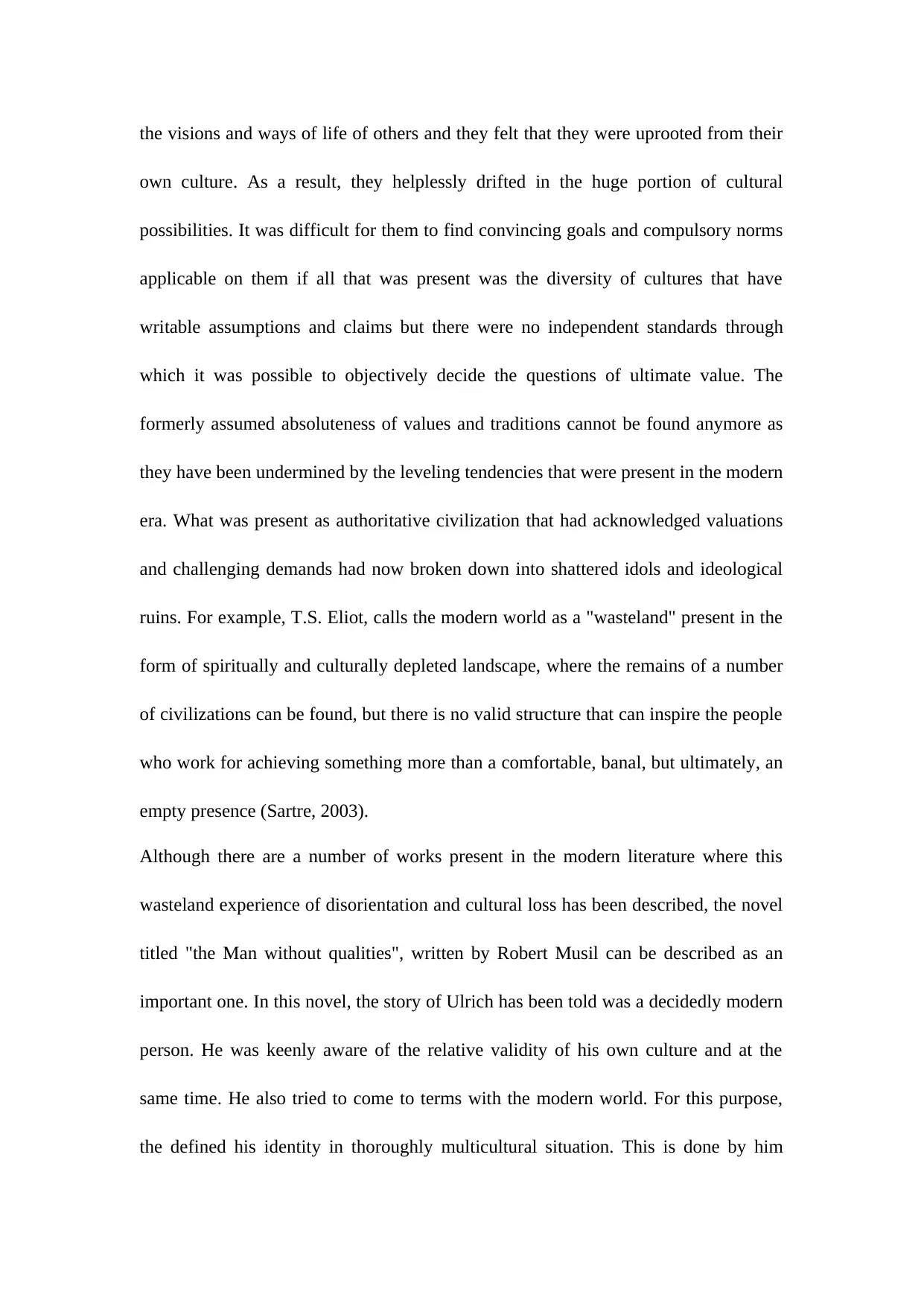
the visions and ways of life of others and they felt that they were uprooted from their
own culture. As a result, they helplessly drifted in the huge portion of cultural
possibilities. It was difficult for them to find convincing goals and compulsory norms
applicable on them if all that was present was the diversity of cultures that have
writable assumptions and claims but there were no independent standards through
which it was possible to objectively decide the questions of ultimate value. The
formerly assumed absoluteness of values and traditions cannot be found anymore as
they have been undermined by the leveling tendencies that were present in the modern
era. What was present as authoritative civilization that had acknowledged valuations
and challenging demands had now broken down into shattered idols and ideological
ruins. For example, T.S. Eliot, calls the modern world as a "wasteland" present in the
form of spiritually and culturally depleted landscape, where the remains of a number
of civilizations can be found, but there is no valid structure that can inspire the people
who work for achieving something more than a comfortable, banal, but ultimately, an
empty presence (Sartre, 2003).
Although there are a number of works present in the modern literature where this
wasteland experience of disorientation and cultural loss has been described, the novel
titled "the Man without qualities", written by Robert Musil can be described as an
important one. In this novel, the story of Ulrich has been told was a decidedly modern
person. He was keenly aware of the relative validity of his own culture and at the
same time. He also tried to come to terms with the modern world. For this purpose,
the defined his identity in thoroughly multicultural situation. This is done by him
own culture. As a result, they helplessly drifted in the huge portion of cultural
possibilities. It was difficult for them to find convincing goals and compulsory norms
applicable on them if all that was present was the diversity of cultures that have
writable assumptions and claims but there were no independent standards through
which it was possible to objectively decide the questions of ultimate value. The
formerly assumed absoluteness of values and traditions cannot be found anymore as
they have been undermined by the leveling tendencies that were present in the modern
era. What was present as authoritative civilization that had acknowledged valuations
and challenging demands had now broken down into shattered idols and ideological
ruins. For example, T.S. Eliot, calls the modern world as a "wasteland" present in the
form of spiritually and culturally depleted landscape, where the remains of a number
of civilizations can be found, but there is no valid structure that can inspire the people
who work for achieving something more than a comfortable, banal, but ultimately, an
empty presence (Sartre, 2003).
Although there are a number of works present in the modern literature where this
wasteland experience of disorientation and cultural loss has been described, the novel
titled "the Man without qualities", written by Robert Musil can be described as an
important one. In this novel, the story of Ulrich has been told was a decidedly modern
person. He was keenly aware of the relative validity of his own culture and at the
same time. He also tried to come to terms with the modern world. For this purpose,
the defined his identity in thoroughly multicultural situation. This is done by him
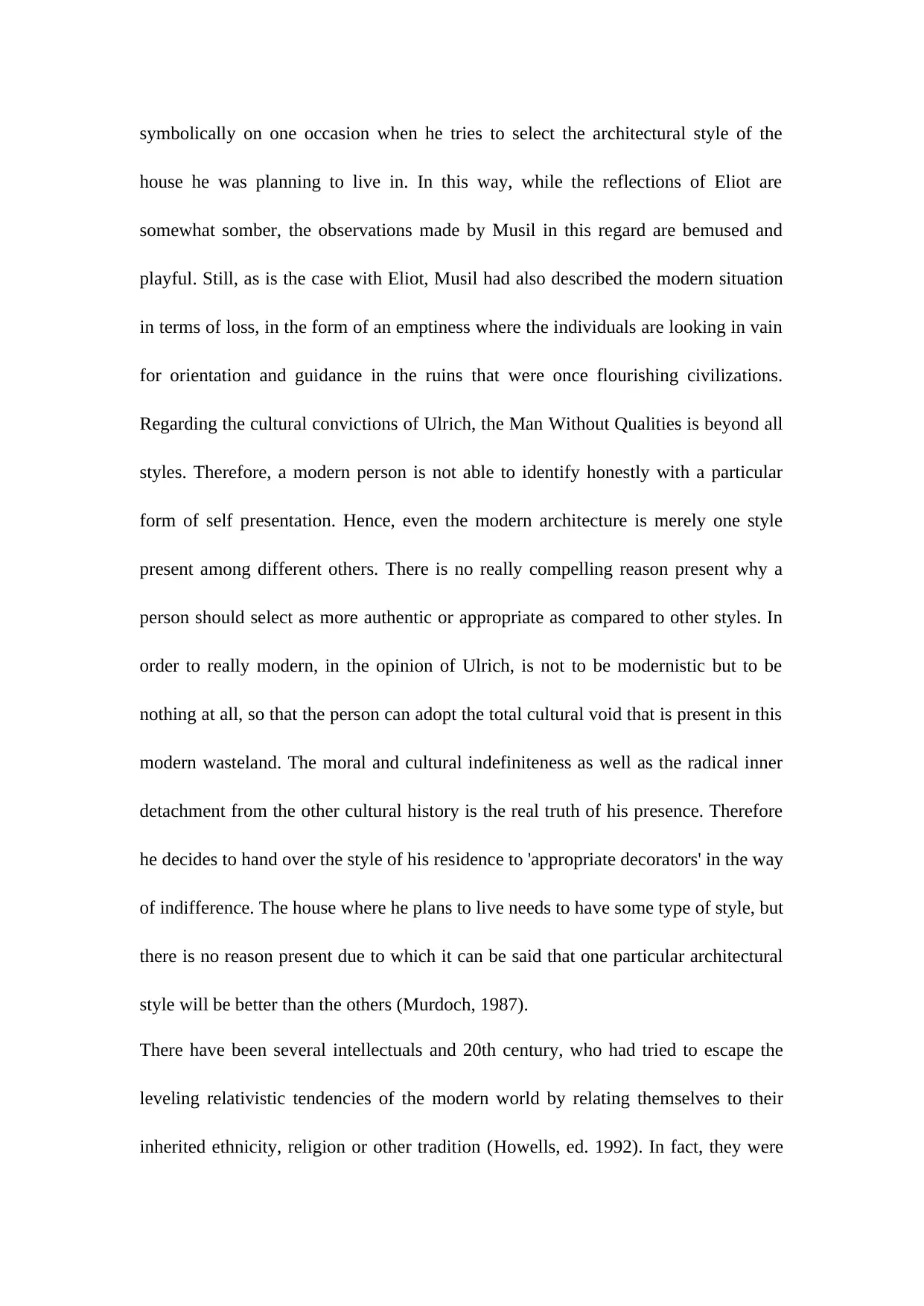
symbolically on one occasion when he tries to select the architectural style of the
house he was planning to live in. In this way, while the reflections of Eliot are
somewhat somber, the observations made by Musil in this regard are bemused and
playful. Still, as is the case with Eliot, Musil had also described the modern situation
in terms of loss, in the form of an emptiness where the individuals are looking in vain
for orientation and guidance in the ruins that were once flourishing civilizations.
Regarding the cultural convictions of Ulrich, the Man Without Qualities is beyond all
styles. Therefore, a modern person is not able to identify honestly with a particular
form of self presentation. Hence, even the modern architecture is merely one style
present among different others. There is no really compelling reason present why a
person should select as more authentic or appropriate as compared to other styles. In
order to really modern, in the opinion of Ulrich, is not to be modernistic but to be
nothing at all, so that the person can adopt the total cultural void that is present in this
modern wasteland. The moral and cultural indefiniteness as well as the radical inner
detachment from the other cultural history is the real truth of his presence. Therefore
he decides to hand over the style of his residence to 'appropriate decorators' in the way
of indifference. The house where he plans to live needs to have some type of style, but
there is no reason present due to which it can be said that one particular architectural
style will be better than the others (Murdoch, 1987).
There have been several intellectuals and 20th century, who had tried to escape the
leveling relativistic tendencies of the modern world by relating themselves to their
inherited ethnicity, religion or other tradition (Howells, ed. 1992). In fact, they were
house he was planning to live in. In this way, while the reflections of Eliot are
somewhat somber, the observations made by Musil in this regard are bemused and
playful. Still, as is the case with Eliot, Musil had also described the modern situation
in terms of loss, in the form of an emptiness where the individuals are looking in vain
for orientation and guidance in the ruins that were once flourishing civilizations.
Regarding the cultural convictions of Ulrich, the Man Without Qualities is beyond all
styles. Therefore, a modern person is not able to identify honestly with a particular
form of self presentation. Hence, even the modern architecture is merely one style
present among different others. There is no really compelling reason present why a
person should select as more authentic or appropriate as compared to other styles. In
order to really modern, in the opinion of Ulrich, is not to be modernistic but to be
nothing at all, so that the person can adopt the total cultural void that is present in this
modern wasteland. The moral and cultural indefiniteness as well as the radical inner
detachment from the other cultural history is the real truth of his presence. Therefore
he decides to hand over the style of his residence to 'appropriate decorators' in the way
of indifference. The house where he plans to live needs to have some type of style, but
there is no reason present due to which it can be said that one particular architectural
style will be better than the others (Murdoch, 1987).
There have been several intellectuals and 20th century, who had tried to escape the
leveling relativistic tendencies of the modern world by relating themselves to their
inherited ethnicity, religion or other tradition (Howells, ed. 1992). In fact, they were
⊘ This is a preview!⊘
Do you want full access?
Subscribe today to unlock all pages.

Trusted by 1+ million students worldwide
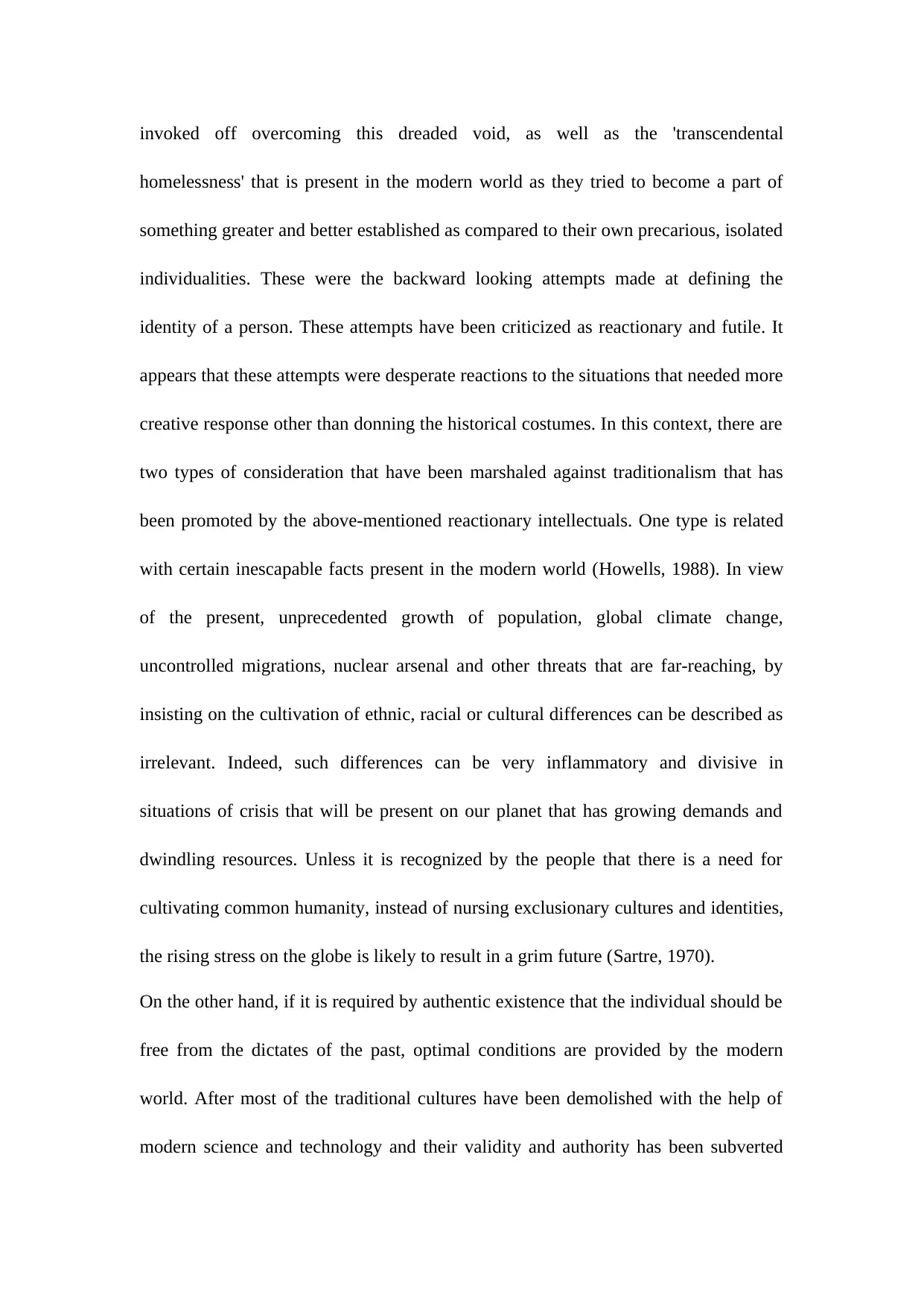
invoked off overcoming this dreaded void, as well as the 'transcendental
homelessness' that is present in the modern world as they tried to become a part of
something greater and better established as compared to their own precarious, isolated
individualities. These were the backward looking attempts made at defining the
identity of a person. These attempts have been criticized as reactionary and futile. It
appears that these attempts were desperate reactions to the situations that needed more
creative response other than donning the historical costumes. In this context, there are
two types of consideration that have been marshaled against traditionalism that has
been promoted by the above-mentioned reactionary intellectuals. One type is related
with certain inescapable facts present in the modern world (Howells, 1988). In view
of the present, unprecedented growth of population, global climate change,
uncontrolled migrations, nuclear arsenal and other threats that are far-reaching, by
insisting on the cultivation of ethnic, racial or cultural differences can be described as
irrelevant. Indeed, such differences can be very inflammatory and divisive in
situations of crisis that will be present on our planet that has growing demands and
dwindling resources. Unless it is recognized by the people that there is a need for
cultivating common humanity, instead of nursing exclusionary cultures and identities,
the rising stress on the globe is likely to result in a grim future (Sartre, 1970).
On the other hand, if it is required by authentic existence that the individual should be
free from the dictates of the past, optimal conditions are provided by the modern
world. After most of the traditional cultures have been demolished with the help of
modern science and technology and their validity and authority has been subverted
homelessness' that is present in the modern world as they tried to become a part of
something greater and better established as compared to their own precarious, isolated
individualities. These were the backward looking attempts made at defining the
identity of a person. These attempts have been criticized as reactionary and futile. It
appears that these attempts were desperate reactions to the situations that needed more
creative response other than donning the historical costumes. In this context, there are
two types of consideration that have been marshaled against traditionalism that has
been promoted by the above-mentioned reactionary intellectuals. One type is related
with certain inescapable facts present in the modern world (Howells, 1988). In view
of the present, unprecedented growth of population, global climate change,
uncontrolled migrations, nuclear arsenal and other threats that are far-reaching, by
insisting on the cultivation of ethnic, racial or cultural differences can be described as
irrelevant. Indeed, such differences can be very inflammatory and divisive in
situations of crisis that will be present on our planet that has growing demands and
dwindling resources. Unless it is recognized by the people that there is a need for
cultivating common humanity, instead of nursing exclusionary cultures and identities,
the rising stress on the globe is likely to result in a grim future (Sartre, 1970).
On the other hand, if it is required by authentic existence that the individual should be
free from the dictates of the past, optimal conditions are provided by the modern
world. After most of the traditional cultures have been demolished with the help of
modern science and technology and their validity and authority has been subverted
Paraphrase This Document
Need a fresh take? Get an instant paraphrase of this document with our AI Paraphraser
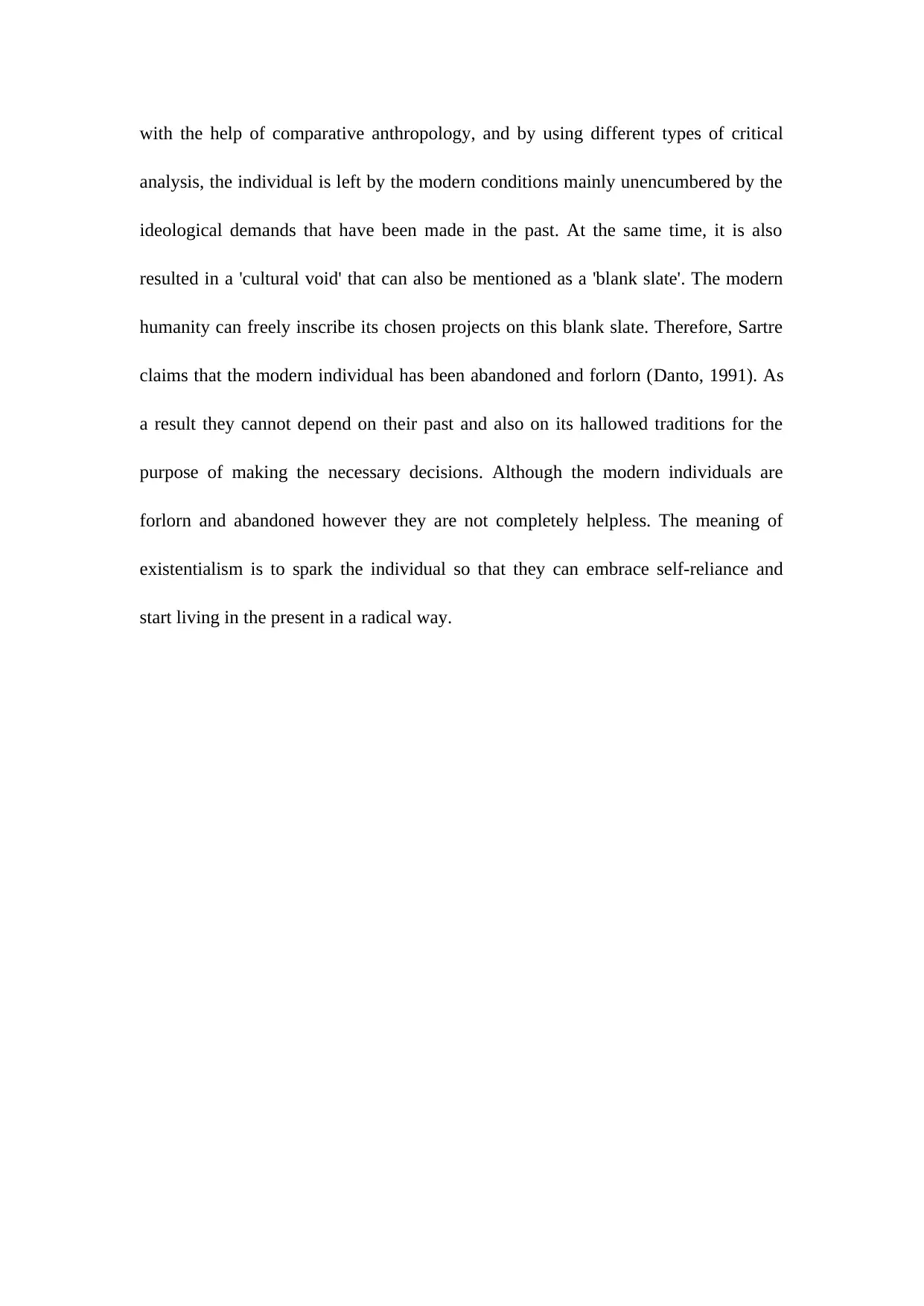
with the help of comparative anthropology, and by using different types of critical
analysis, the individual is left by the modern conditions mainly unencumbered by the
ideological demands that have been made in the past. At the same time, it is also
resulted in a 'cultural void' that can also be mentioned as a 'blank slate'. The modern
humanity can freely inscribe its chosen projects on this blank slate. Therefore, Sartre
claims that the modern individual has been abandoned and forlorn (Danto, 1991). As
a result they cannot depend on their past and also on its hallowed traditions for the
purpose of making the necessary decisions. Although the modern individuals are
forlorn and abandoned however they are not completely helpless. The meaning of
existentialism is to spark the individual so that they can embrace self-reliance and
start living in the present in a radical way.
analysis, the individual is left by the modern conditions mainly unencumbered by the
ideological demands that have been made in the past. At the same time, it is also
resulted in a 'cultural void' that can also be mentioned as a 'blank slate'. The modern
humanity can freely inscribe its chosen projects on this blank slate. Therefore, Sartre
claims that the modern individual has been abandoned and forlorn (Danto, 1991). As
a result they cannot depend on their past and also on its hallowed traditions for the
purpose of making the necessary decisions. Although the modern individuals are
forlorn and abandoned however they are not completely helpless. The meaning of
existentialism is to spark the individual so that they can embrace self-reliance and
start living in the present in a radical way.
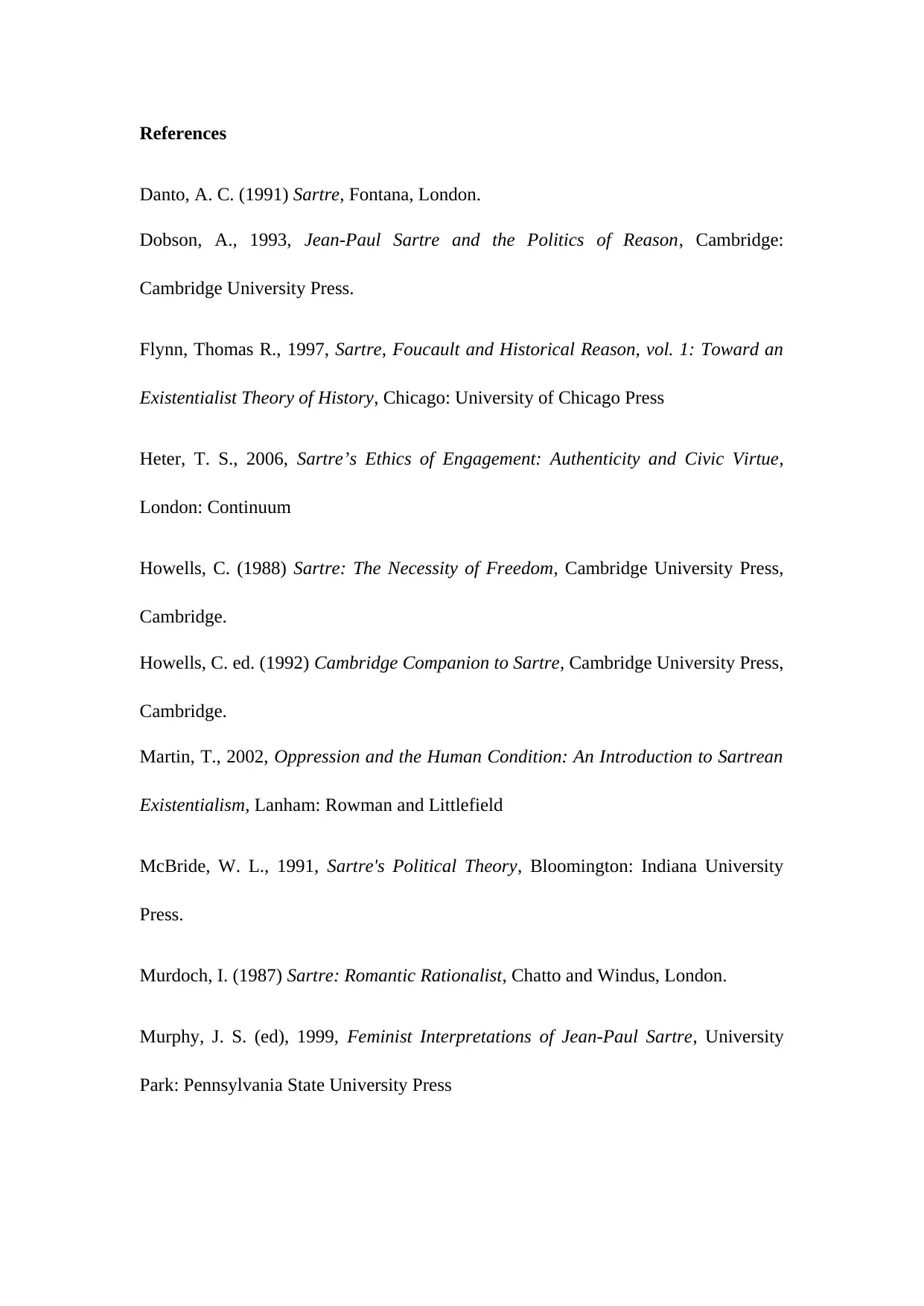
References
Danto, A. C. (1991) Sartre, Fontana, London.
Dobson, A., 1993, Jean-Paul Sartre and the Politics of Reason, Cambridge:
Cambridge University Press.
Flynn, Thomas R., 1997, Sartre, Foucault and Historical Reason, vol. 1: Toward an
Existentialist Theory of History, Chicago: University of Chicago Press
Heter, T. S., 2006, Sartre’s Ethics of Engagement: Authenticity and Civic Virtue,
London: Continuum
Howells, C. (1988) Sartre: The Necessity of Freedom, Cambridge University Press,
Cambridge.
Howells, C. ed. (1992) Cambridge Companion to Sartre, Cambridge University Press,
Cambridge.
Martin, T., 2002, Oppression and the Human Condition: An Introduction to Sartrean
Existentialism, Lanham: Rowman and Littlefield
McBride, W. L., 1991, Sartre's Political Theory, Bloomington: Indiana University
Press.
Murdoch, I. (1987) Sartre: Romantic Rationalist, Chatto and Windus, London.
Murphy, J. S. (ed), 1999, Feminist Interpretations of Jean-Paul Sartre, University
Park: Pennsylvania State University Press
Danto, A. C. (1991) Sartre, Fontana, London.
Dobson, A., 1993, Jean-Paul Sartre and the Politics of Reason, Cambridge:
Cambridge University Press.
Flynn, Thomas R., 1997, Sartre, Foucault and Historical Reason, vol. 1: Toward an
Existentialist Theory of History, Chicago: University of Chicago Press
Heter, T. S., 2006, Sartre’s Ethics of Engagement: Authenticity and Civic Virtue,
London: Continuum
Howells, C. (1988) Sartre: The Necessity of Freedom, Cambridge University Press,
Cambridge.
Howells, C. ed. (1992) Cambridge Companion to Sartre, Cambridge University Press,
Cambridge.
Martin, T., 2002, Oppression and the Human Condition: An Introduction to Sartrean
Existentialism, Lanham: Rowman and Littlefield
McBride, W. L., 1991, Sartre's Political Theory, Bloomington: Indiana University
Press.
Murdoch, I. (1987) Sartre: Romantic Rationalist, Chatto and Windus, London.
Murphy, J. S. (ed), 1999, Feminist Interpretations of Jean-Paul Sartre, University
Park: Pennsylvania State University Press
⊘ This is a preview!⊘
Do you want full access?
Subscribe today to unlock all pages.

Trusted by 1+ million students worldwide
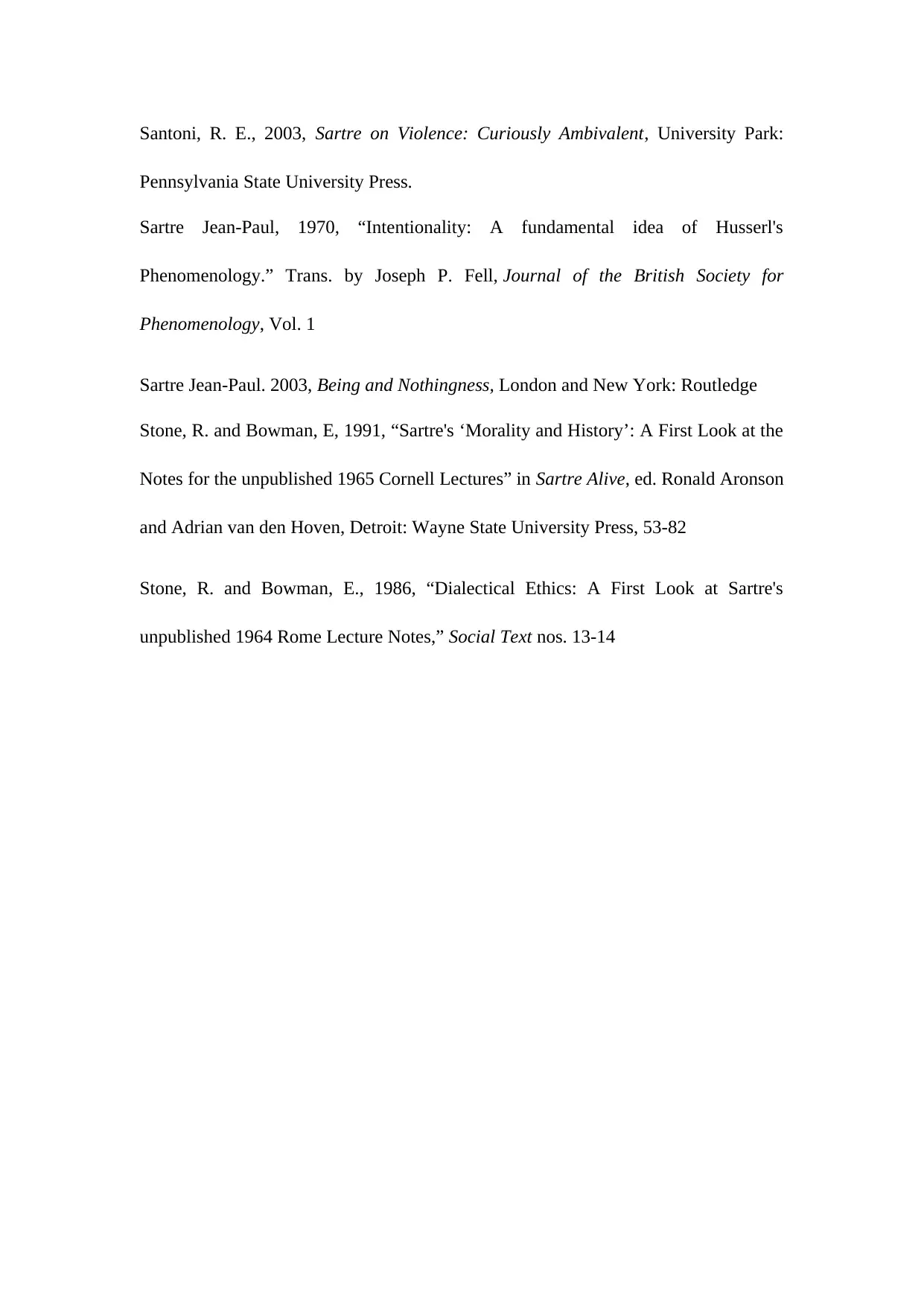
Santoni, R. E., 2003, Sartre on Violence: Curiously Ambivalent, University Park:
Pennsylvania State University Press.
Sartre Jean-Paul, 1970, “Intentionality: A fundamental idea of Husserl's
Phenomenology.” Trans. by Joseph P. Fell, Journal of the British Society for
Phenomenology, Vol. 1
Sartre Jean-Paul. 2003, Being and Nothingness, London and New York: Routledge
Stone, R. and Bowman, E, 1991, “Sartre's ‘Morality and History’: A First Look at the
Notes for the unpublished 1965 Cornell Lectures” in Sartre Alive, ed. Ronald Aronson
and Adrian van den Hoven, Detroit: Wayne State University Press, 53-82
Stone, R. and Bowman, E., 1986, “Dialectical Ethics: A First Look at Sartre's
unpublished 1964 Rome Lecture Notes,” Social Text nos. 13-14
Pennsylvania State University Press.
Sartre Jean-Paul, 1970, “Intentionality: A fundamental idea of Husserl's
Phenomenology.” Trans. by Joseph P. Fell, Journal of the British Society for
Phenomenology, Vol. 1
Sartre Jean-Paul. 2003, Being and Nothingness, London and New York: Routledge
Stone, R. and Bowman, E, 1991, “Sartre's ‘Morality and History’: A First Look at the
Notes for the unpublished 1965 Cornell Lectures” in Sartre Alive, ed. Ronald Aronson
and Adrian van den Hoven, Detroit: Wayne State University Press, 53-82
Stone, R. and Bowman, E., 1986, “Dialectical Ethics: A First Look at Sartre's
unpublished 1964 Rome Lecture Notes,” Social Text nos. 13-14
1 out of 10
Related Documents
Your All-in-One AI-Powered Toolkit for Academic Success.
+13062052269
info@desklib.com
Available 24*7 on WhatsApp / Email
![[object Object]](/_next/static/media/star-bottom.7253800d.svg)
Unlock your academic potential
Copyright © 2020–2025 A2Z Services. All Rights Reserved. Developed and managed by ZUCOL.





